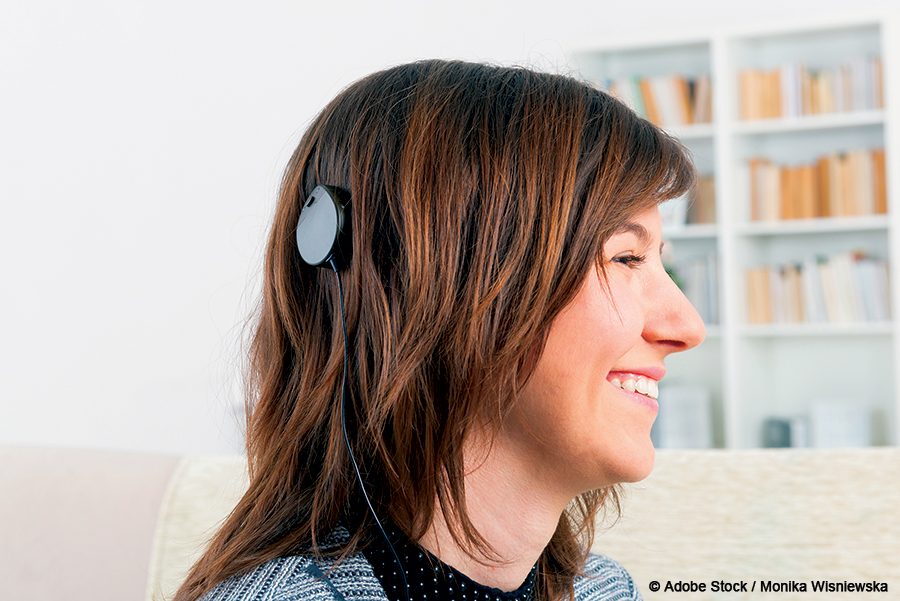 People with bilateral cochlear implantation have diminished perception of musical attributes, which limits their emotional response when listening, according to new findings presented at the Triological Society Combined Sections Meeting. The findings add a new dimension to the understanding of how cochlear implants detract from the quality of a person’s experience relating to music, the researchers said.
People with bilateral cochlear implantation have diminished perception of musical attributes, which limits their emotional response when listening, according to new findings presented at the Triological Society Combined Sections Meeting. The findings add a new dimension to the understanding of how cochlear implants detract from the quality of a person’s experience relating to music, the researchers said.
Explore This Issue
April 2024“It’s been well documented that music perception and enjoyment are diminished in these individuals,” said Isaac Alter, AB, a second-year medical student at Columbia University in New York City who presented the findings. “Studies have shown that while rhythm is preserved, the detection of pitch, harmony, and timbre are all impaired after implantation. And some studies show that over 50% of implantees report decreased enjoyment after implantation.”
The emotional aspect, however, hasn’t been explored extensively, he noted. “Emotional responses to music may be dampened after implantation, and this hasn’t been previously studied in adult bilateral cochlear implant users.”
I think we would all be hard pressed to think about our enjoyment of music in the absence of an emotional response or with a diminished emotional response. —Isaac Alter, AB
The study included 25 bilateral cochlear implant users and 18 controls with normal hearing who were pulled from the Columbia University system and through community outreach. Researchers collected demographic and hearing history; those with cochlear implants had had hearing loss for an average of 39 years and had had cochlear implants for 13 years. Because of the prevalence of hearing loss later in life, researchers couldn’t put together an age-matched control group, and the average age of the cochlear implant group was 64 years, compared to 36 years for the control group.
The participants performed a listening task in which they rated the “valence” and “arousal” in music from a variety of genres. Valence is the emotional continuum from happy to sad, and arousal is the continuum from excited to calm—factors that feed into a listener’s emotional experience.
Researchers recorded the maximum and minimum valence and arousal that could be appreciated by each participant and used that to determine the range of valence and arousal. They found a significant difference in the arousal that could be appreciated (P = 0.0086)—those with implants had a lower ceiling in the arousal that they appreciated—but not in the valence. This also meant a significant differ-ence in the range of arousal that could be appreciated between the groups (P = 0.0025).
Then, using normative values that had been established by prior researchers using the same musical clips, researchers assessed how accurately the two cohorts perceived the valence and the arousal. They found no difference in the ability to correctly identify arousal, but cochlear implant users had a significantly higher error rate when it came to identifying the valence in the music clips (P < 0.001), Alter said.
“There were significant differences for the four stimuli at the extremes of valence and arousal—the highest and lowest valence and arousal all had significant differences between cohorts,” he said.
The researchers hypothesized that the reduction in the range of arousal appreciation for music could result from a lowered appreciation of dynamics or volume range when listening to music with a cochlear implant, Alter said, adding that the difference in valence detection could stem from an inability to distinguish subtle pitch changes, such as a half-step change that could be the difference between a major, or “happy-sounding,” key, and a minor, or “sad-sounding,” key.
“We found that arousal range and valence detection are substantially diminished among bilateral cochlear implant users,” Alter said. “I just want to drive home the clinical relevance of that. It’s sort of easy to get lost in the weeds of these terms. But I think we would all be hard pressed to think about our enjoyment of music in the absence of an emotional response or with a diminished emotional response.”
Thomas R. Collins is a freelance medical writer based in Florida.